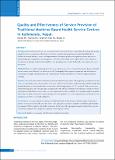Please use this identifier to cite or link to this item:
https://hdl.handle.net/20.500.14356/1853| Title: | Quality and effectiveness of Service Provision of Traditional Medicine Based Health Service Centres in Kathmandu Nepal |
| Authors: | Koirala, R R Khaniya, B N Singh, S P Aryal, K K Bhusal, C L |
| Citation: | Singh SP, Aryal KK, Bhusal CLK. R. K. B. (2013). Quality and effectiveness of Service Provision of Traditional Medicine Based Health Service Centres in Kathmandu Nepal. Journal of Nepal Health Research Council. https://doi.org/10.33314/jnhrc.v0i0.387 |
| Issue Date: | 2013 |
| Publisher: | Nepal Health Research Council |
| Article Type: | Original Article |
| Series/Report no.: | May-Aug, 2013;387 |
| Abstract: | Abstract Background: Health services based on traditional systems of medicine has been expanding, flourishing and getting popularity, however, quality and effectiveness of service provision, has always been questionedprobably due to the lack of research activities, poor or nil implementation of national policies and regularity systems and poor or nilmonitoring and evaluation by any state agencies. Objective of this study was to explore the present situation of privately run traditional medicine based health service providing centres in the Kathmandu valley and service users’ perception. Methods: Data were gathered through interview, observation, and review of relevant documents. Registered health service centres were selected (5 each from Ayurveda, Naturopathy, Homeopathy, Acupuncture and Amchisystem of medicine) by simple random method and 132 patients (5-7 from each centre) were selected using convenient sampling. Results: Three of the five systems of traditional medicine (Homeopathy, Amchi and Acupuncture) considered for this study were providing services through clinic level (only OPD services) facilities, while Ayurveda and Naturopathy had hospital (in patient services) level services with number of beds ranging from 10 -25. Nearly all of the centres were found following almost all of the guidelines as stipulated by the Ministry of Health and Population. Nearly, two third of the patients visited these centres as there was no improvement in their condition at the modern medicine hospitals. More than two third of the patients interviewed perceived the quality of services being satisfactory, while three in ten patients perceived it as very much satisfactory. Conclusions: Perception of patients visiting the traditional medicine based centres and the hunger towards more effective service provision by the providers seems to be taking these systems of medicine towards the path of further development. Well recognition and further motivation by the state will help capacitate and strengthen these systems of medicine and garner their proper development in the Nepalese context. |
| Description: | Original Article |
| URI: | http://103.69.126.140:8080/handle/20.500.14356/1853 |
| ISSN: | Print ISSN: 1727-5482; Online ISSN: 1999-6217 |
| Appears in Collections: | Vol. 11 No. 2 Issue 24 May - Aug, 2013 |
Files in This Item:
| File | Description | Size | Format | |
|---|---|---|---|---|
| 387-Article Text-434-1-10-20131127.pdf | Fulltext Download | 479.89 kB | Adobe PDF |  View/Open |
Items in DSpace are protected by copyright, with all rights reserved, unless otherwise indicated.
